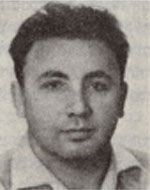Shalom, son of Hendel and Shimon, was born on August 17, 1920, in the city of Zwierce, Poland, where he studied in an elementary school in his hometown and also attended the local Jewish school. Although his years of childhood and much of his youth were spent in the Polish Diaspora, he was close to Judaism and its values, and since all these years his parents were careful to provide him with a Jewish education and their home was a traditional Jewish home. In 1935, his dreams were fulfilled when his parents decided to immigrate to Eretz Israel, as if they sensed the imminent Holocaust about Polish Jewry After he arrived in Israel, Shalom went to work, tried various jobs but was disappointed, because his Lev was not at peace with his actions, he joined the Hanoar Haoved movement and in 1938, about three years after arriving in Israel , He went out with his friends to a training movement in Ramat David, where he finally found what he wanted, and suddenly discovered that despite all the years he had been engaged in various crafts, the open fields, the work of the land and the occupation of the farm had fascinated him. Himself full realization. In the following years he joined Ramat Yohanan and also lived in Poriah. In 1942, he joined the ranks of the British army, within the framework of the Palestine companies. At first he served in Israel, but at the end of World War II, he served in Egypt and even came to Italy. After a long period of waiting in Israel, he was Simcha that he had been allowed to participate in real battles against the Nazi armies. At the end of the war he returned to Israel and joined the ranks of the Haganah. He put his experience as a soldier in the British army at the disposal of the Yishuv, which was organized to protect the Jewish population from the harassment of Arab gangs. He took part in activities initiated by the Hagana and mainly helped in training and training novices. At the same time he also worked for Tnuva Export. Despite his many occupations, which took most of his time, he still had time to engage in music and philosophy – two areas he was especially fond of. He did not stop there, and did a lot of public work. Shalom was drafted into the IDF at the beginning of April 1948. The IDF was then in the initial stages of organization and since Shalom had a previous combat experience as a soldier in the British engineering corps and as part of the Hagana, he was assigned to the Palmach’s Harel Brigade, He participated in the battles for Jerusalem and Operation Ein in the Negev, and was accompanied by many of the convoys of many convoys who broke into besieged Jerusalem. In the same days, Shalom married Geula his girlfriend, and eventually they had three sons. In 1950, Shalom began working as a professional section of the Hanoar Haoved movement and in 1955 he joined the company’s peanut and cotton marketing staff as national coordinator, and in 1967 participated in the Six Day War in the battles of the Jordan Valley. He participated in the battles for the breakthrough to the western bank of the Suez Canal, and on October 22, 1973, the Ammunition convoy, one of its leaders, was hit and killed and brought to rest in the Kfar Sava cemetery. He left behind a wife and three sons. After his fall, he was promoted to sergeant. In a letter of condolence to the bereaved family, his commander wrote: “Shalom went out on a mission from which he did not return, calmly and without complaints.Which landed on the convoy after crossing the canal to the West Bank. He did not lose his temper, helped and encouraged, until he was killed. “
